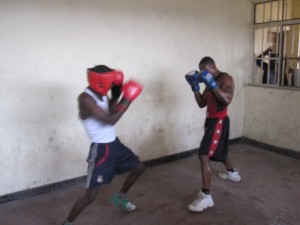Goma, Nord-Kivu March 3rd
 With less than a week to go to Kibomango’s Fight Day the training is on in earnest and the early morning sessions now proceed to plan like a military operation. I am inside the training camp of a champion boxer and the atmosphere is serious and precise.
With less than a week to go to Kibomango’s Fight Day the training is on in earnest and the early morning sessions now proceed to plan like a military operation. I am inside the training camp of a champion boxer and the atmosphere is serious and precise.
Myself and the other students arrive, do a group work-out and proceed to the boxing drills led by Cédric, the top student who is also competing nationally next week. Kibomango works separately with his own coach who is as tough a taskmaster as ever and we hear their blows and shouts in the next room. After an hour or more of this, we break and join each other for the practice bouts which take place inside one of the dressing rooms of the Stade des Volcans football grounds. These bouts have become rather serious; the point is to provide Kibomango with a simulated fight experience and to be even remotely useful we are meant to throw everything we have at him—he can handle it all.
There are 6 of us and we are to do 2 rounds each, or 12 altogether, meaning Kibomango faces a fresh fighter every other round in an effort to wear down the Titan. There is a loose order with the stronger boxers going first. The fights look intense and the young boxers, most of whom have been training for some time, are rising to the occasion. Now and then it even looks like real combat with a boxer being knocked down. If there is a particularly hard hit, the round is stopped and, as is custom here in the Club des Amitiés, the two boxers embrace amid loud clapping from the group who are gathered around the edge of the room and crowded outside at the windows looking in.
I am the last fighter of the morning, confirming my lowly status, but the training is about him not me and I keep that in mind as the boxing gloves are put on. I even have a coach in my corner, Cédric, who whispers some advice about keeping up my guard. This is my George Plimpton moment and when the trainer calls us to knock gloves in salutation, before declaring “Boxé!”, the fight is on. I realise how ridiculous and token this situation is for Kibomango but he humours me and respects the occasion by sparring seriously and dodging the blows. I don’t have long so I decide I might as well spaz-out and throw as many punches as I can and let Kibomango block or dodge them. I feel winded at the end, and faintly ridiculous, but when it is over and there is some applause I’m reminded of the beauty of the event and the sense of community this boxing team provides.
As always, we conclude with the Club des Amitiés team songs—gathering in a circle, running on the spot and pumping our fists up and down at chest height while singing our boxing chants. These are led by Kibomango and are quite musical and I even hear them in my sleep—some are in Swahili, some in French—concluding with our fists together in the middle of the circle and shouting: “toujours amitiés!” But before we can go, and as always, we bow our heads and a prayer is said. It is by these rituals that this little boxing club—whose members are all very poor people, and some of the kids from very hard lives—shows its benign and very humane culture.
I expected many things when I came to Congo but never that I would find the greatest humanity here in a boxing club. Sadly, this is my last day of boxing here and probably for some time: I’m still weak in this session, haven’t fully recovered from typhoid or whatever else is ailing me. In less than a day I will be back in hospital; it ends up being malaria.

je lit çela sur le train pour montréal. quelle belle et intime experience!
ne dit pas que tu tombe malade, vraiment. habari?
Hi Jennifer
Yes, a fantastic experience and a priviledge…. End of boxing for me….. have malaria.